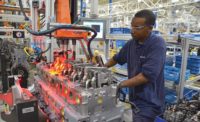
Pat Ovington (left), material scheduler, and Rich Robinson (right), team coordinator, discuss the production schedule within the mainline assembly area. Rob Cannoy (background), manufacturing associate, views equipment status on one of TRW’s assembly lines. Source: TRW
TRW wants you to be safe. Specifically, the company, based in Livonia, MI, wants you to be safe while driving, as it manufactures automotive safety equipment, including airbags, seat belts, steering, brakes and steering wheels.
Safety is obviously serious business, and TRW places quality as a top priority when producing its parts. They want the car to stop when needed, and if something goes wrong, for the airbag to deploy.
The Fowlerville, MI, plant, about an hour outside Detroit, has their quality motto etched onto the entrance, reminding staff and visitors how seriously they take their work.
And if that doesn’t hit home, the booties should make that clear. Visitors to the clean room area are outfitted in lab coats, safety goggles, hair nets and even booties that cover their shoes. Contamination could cause problems so they guard against errant specks of dust or dirt entering the area. A 300-micron length particle in any direction is their tolerance limit.
Tolerances have obviously tightened since TRW and its founding companies developed wooden wheels for Henry Ford’s Model T.

Desiree Murningham performs a quick visual inspection of an ABS valve. Source: TRW
Goals
Customers have noticed and applauded the company for their efforts. Though the company says it does not go overboard with awards, preferring happy customers to trophies, its work has been noticed. TRW has been benchmarking other organizations, and inviting them to come in and see their work firsthand. TRW has worked with NASA, Honda, Kohler and others in benchmarking.Though the company is based in Michigan, management still needs to set strategy and communicate with their teams worldwide. This can lead to a lot of time on the road; at the time of Quality’s visit, Bryce Currie, vice president, quality, program management and business excellence, had visited 12 plants in the previous six weeks, including some in China and India.
The various locations promote visibility to capture good ideas and best practices. Plant manager Bob Holman manages the North American slip control systems plants, which include anti-lock brake and electronic stability control systems from Fowlerville, MI, and the sister plant in Fenton, MI. This has led to a healthy competition between his plants.
This competition goes beyond Michigan, however. A visitor from Poland allowed staff to share best practices and benchmark. Krzysztof Janiga, global manager, business excellence and Six Sigma, was visiting the Michigan plant from Poland duringQuality’s visit.
Indeed, though Ford is their No.1 customer, the North American plant ships to India, China and Germany, and they deal with 10 million components on a monthly basis for their OEM customers.
Due to a global electronic component shortage, performance rates have suffered. This has affected multiple industries, not just automotive. The electronics manufacturers have not been able to keep up with demand as the economy turned around.
Revenue numbers are down from the pre-economic crisis days. However, the warranty costs also are down-they have improved by 70% since the model year 2006.
The company knows that warranties are a huge issue, costing the industry billions annually. Though TRW’s warranty stats are good, they want to get better. Warranty costs, like contamination, are best avoided.
“We want to get to where there’s no warranty [costs] out there,” says Currie. “That would be the ideal.”
TRW is not just wishing and hoping for better warranty results-they are closely monitoring them with best practices and standardization. Eliminating variation continues to be the goal.
Today, warranty costs run at less than ½% while the industry as a whole is running at approximately 1.5% as a percentage of sales. Warranty cost is a metric all TRW plants track.
At the plant level the Fowlerville facility has been able to deliver a failure cost of less than 1% (inclusive of warranty). The most recent months has had a record performance of less than 0.4% failure cost. Fowlerville has daily cell meetings with the group to discuss yield and scrap.
Success is a Journey
The plant entrance includes a flat screen showing real-time data-no shortage of information here. The cells are each clearly labeled and color coded to mistake proof the production process. And the shop floor is divided so the assembly division treats machining like a supplier.Though it does not look 16 years old, the current plant has been around since 1994. It has been focusing on quality the entire time, with various improvement initiatives.
In 1999, the company focused on the cell and plant level with their ops excellence program. A few years later, they aggressively pursued Six Sigma, and as a result, have achieved Six Sigma quality levels in terms of global PPM (6.4 PPM). In 2001-2002, the company had 400 Black Belts. While there are fewer Black Belts today, the focus has merged to jointly encompass both Six Sigma and statistical engineering methodologies as a global standard of problem solving.
Best practice and standardization is a TRW global requirement-One standard, One company, One process.
TRW used to be divisional-based. Staff say that a common refrain was: “If we only knew what we knew.”
In 2003, Northrup Grumman bought the space and defense division of TRW, and it became a purely automotive company. The company then went private, and then public within a year in 2004.
TRW has since bought new companies and continues to expand globally.
For more information, visitwww.trw.com
TRW at a Glance
TRW produces advanced active systems in braking; steering and suspension; and sophisticated occupant safety systems, including airbags, seat belts and steering wheels.Europe: 35,500
North America: 18,000
South America: 4,500
Asia: 5,500
Fowlerville, MI: Approximately 200
1. Best quality. Drive quality in everything we do-products, launches, engineering. Ensure we make the product right the first time and deliver only quality products on time to our customers.
2. Lowest cost. Relentlessly drive down costs to offer customers superior value. Utilize manufacturing programs (Six Sigma and operational excellence) to manage costs to optimal levels.
3. Global reach. Position businesses globally to service key customers and grow with new markets. Pursue opportunities to diversify customer base.
4. Innovative technology. Offer leading-edge systems and products that add value for our customers. Leverage leadership in active and passive safety systems to develop integrated product solutions.


